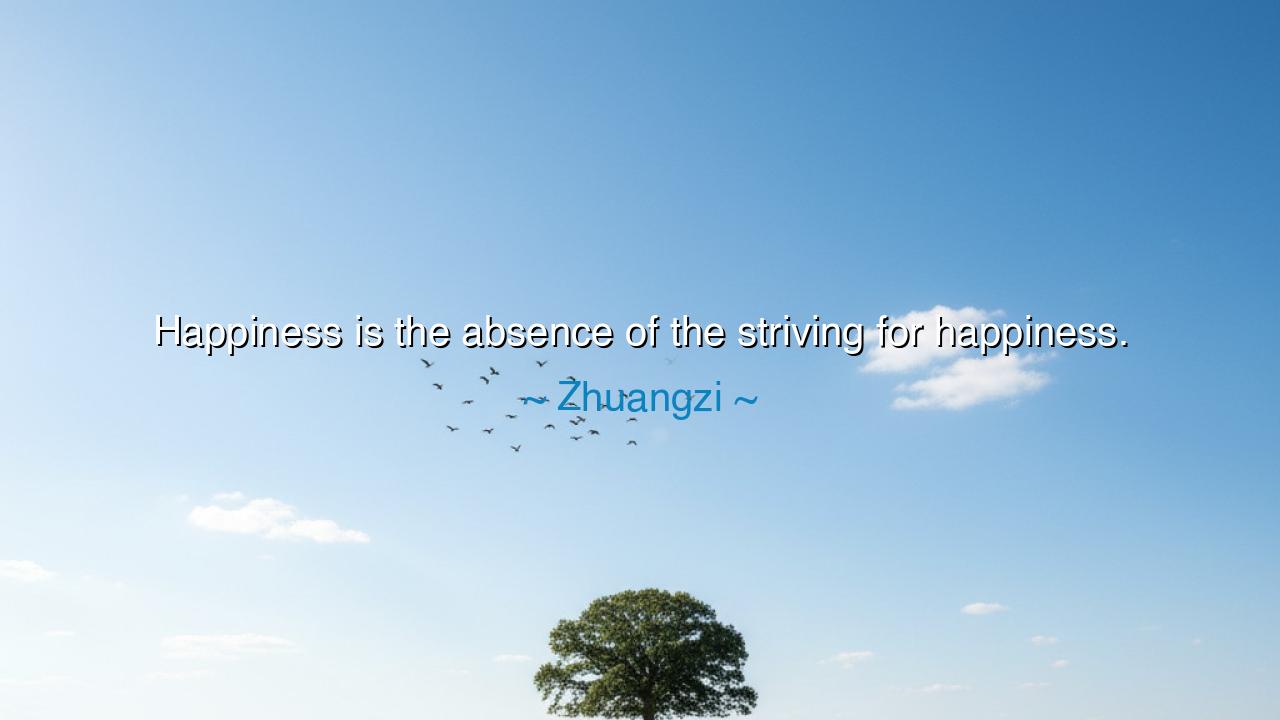
Happiness is the absence of the striving for happiness.






The ancient sage Zhuangzi, the wandering mystic of the Dao, once spoke these timeless words: “Happiness is the absence of the striving for happiness.” Within this simple statement lies the essence of the Daoist way—the quiet truth that joy, peace, and freedom cannot be captured by desire. For the moment one begins to chase happiness, it flees; and the moment one lets go, it arrives. Zhuangzi, who lived in the fourth century before our era, understood the futility of restless seeking. He saw that man, in his hunger for fulfillment, often builds the very cage that keeps him from it.
To the master of the Dao, the world was filled with men chasing illusions: merchants chasing gold, scholars chasing fame, lovers chasing comfort, all believing that happiness lay at the end of pursuit. Yet each, upon reaching what he sought, found himself still unsatisfied, still yearning for more. Zhuangzi saw this and laughed—not a cruel laugh, but the laughter of enlightenment. For he knew that happiness is not a treasure buried at the end of the path—it is the stillness that fills the traveler when he stops running. When one ceases to “strive,” one begins to be.
The story is told that one day, Zhuangzi dreamt he was a butterfly, floating freely upon the wind. When he awoke, he no longer knew whether he had been a man dreaming of a butterfly, or a butterfly dreaming of a man. In that dream, the boundary between self and world vanished, and he tasted the happiness that comes from pure existence, free from striving. The butterfly did not seek to be happy; it simply lived, and therefore it was. Such is the heart of Zhuangzi’s teaching—that to live according to the Dao is to move with the flow of things, not to grasp or resist, but to let life unfold as it will.
This truth, though ancient, reveals itself again in every age. Consider the example of Leo Tolstoy, the great Russian writer, who at the height of his fame and wealth found himself in despair. He had achieved all that men believe brings happiness—success, admiration, abundance—yet his heart was hollow. In his later years, he renounced his possessions, returned to simplicity, and began to live for truth and service. Only then did he find peace. His joy came not from the pursuit of happiness, but from the renunciation of it. Like Zhuangzi, he discovered that when the striving ends, the spirit begins to breathe freely.
The absence of striving is not laziness or apathy—it is serenity. It is the freedom that comes when one ceases to demand that life conform to one’s will. The wise man acts, but does not strain; he creates, but does not cling; he walks the path without asking where it leads. When the heart is still, joy arises naturally, like spring water bubbling from the earth. The foolish man chases happiness as though it were prey to be hunted, and in his pursuit, he grows weary and lost. The wise man waits quietly by the stream, and in time, the reflection of joy appears beside him.
To live this truth, one must practice letting go. Release your obsession with control. Do not ask constantly whether you are happy or unhappy, for such questioning feeds discontent. Instead, turn your gaze to the present moment. Eat with awareness, walk with gratitude, breathe without haste. When sorrow comes, let it pass like clouds across the sky. When joy comes, let it rest upon your heart lightly, like a bird upon a branch. The one who neither clings nor resists will find that life itself becomes effortless, and from that effortlessness, happiness is born.
So, my children, take this wisdom of Zhuangzi to heart: “Happiness is the absence of the striving for happiness.” In your search for joy, do not struggle against the current of life—float upon it. Trust that what you need will find you when your heart is calm and open. For happiness is not something to be conquered; it is something to be allowed. The river does not run faster by forcing its flow; the flower does not bloom sooner by pulling at its petals. In stillness, all things find their time.
Therefore, cease your anxious striving, and dwell in the quiet grace of the present. Let your heart rest where it is. When you stop running toward happiness, you will find it standing beside you, waiting—soft as wind, gentle as light, eternal as the Dao itself.






AAdministratorAdministrator
Welcome, honored guests. Please leave a comment, we will respond soon